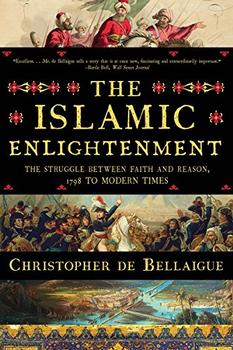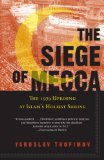Summary | Excerpt | Reviews | Beyond the book | Read-Alikes | Genres & Themes | Author Bio

The First Battle in America's War with Militant Islam
by Mark BowdenFrom the book jacket: On November 4, 1979, a group of
radical Islamist students stormed the U.S. embassy in Tehran. Inspired by the
revolutionary Iranian leader Ayatollah Khomeini, they hoped to stage a three-day
sit-in protest of the American decision to allow exiled Iranian leader Shah
Mohammed Reza to enter the United States for medical treatment. But these
modest, peaceful aims were supplanted by something much more severe and
dangerous. The students took sixty-six Americans hostage and kept the majority
of them for 444 days in a prolonged conflict that riveted the world.
The Iran hostage crisis was a watershed moment in American history. It was
America's first showdown with Islamist fundamentalism, a confrontation that has
remained at the forefront of American policy to this day. In Iran, following the
ousting of the Shah, a provisional government was established, and for a
critical moment in the modern age's first Islamist revolution, a more open and
democratic society seemed possible. But the religious hardliners on the
Revolutionary Council used the hostage crisis as an opportunity to purge
moderates from the leadership ranks. They altered the course of the revolution
and set Iran on the extreme path it follows to this day.
Comment: It's difficult to overstate the impact of the Iran
hostage crisis. For more than 14 months the saga
captivated the American people and much of the world; it crippled Jimmy
Carter's re-election campaign and is even responsible for spawning a new late-night TV program,
which became Nightline. Without it it's likely that a more
moderate, secular government would have taken charge in Iran, and Jimmy Carter
would have won a second term as President of the USA; which would have meant
that Ronald Reagan would not have dominated American politics in the '90s, and
there would have been no Vice-President Bush to become President and thus, more
than likely, no George W. to take over the reigns of power in 2001. The
great irony is that the Iranian students didn't intend to take hostages, let
alone bring down a government (or two), they simply wanted to stage a protest.
As you would expect from a 700 page book, Guests of the Ayatollah covers
the entire crisis in detail, including presidential vacillations (and the
behind-the-scenes reasons for the vacillations) the failed rescue attempts, and
the politics, but Bowden also gives much space to the hostages themselves, some
of whom are fascinating people in their own right. For example,
John
Limbert, who knew more about Iran's history than most of his captors and
spent much of his time translating books from English into Farsi.
It took Bowden five years to write Guests of The Ayatollah during which
time he interviewed dozens of people including Delta Force members, State
Department staffers, hostages and hostage-takers. The result is a
compelling non-fiction work that reads like a novel. Among a number of
interesting facts he highlights is that many ex-hostages believe that Iran's
current president, Mahmoud Ahmadinejad, was one of the hostage-takers (a fact
which is disputed by Ahmadinejad, other hostage takers and, apparently, the
CIA).
Bowden draws parallels between the embassy takeover, that helped the mullahs
overcome secular nationalists within Iran, and the situation today in which the
pendulum appears to be swinging back to the hard-line vision of 25 years ago.
As Bowden says, "Iran thrives on the disapproval of the rest of the world...
when they come into conflict, it's almost reassuring. It re-stokes the fires of
the revolution." A fact that the British government no doubt kept in mind during the almost two-week standoff involving 15 members of the British Navy and Marines
taken hostage by the Iranians in March.
![]() This review was originally published in The BookBrowse Review in June 2006, and has been updated for the
April 2007 edition.
Click here to go to this issue.
This review was originally published in The BookBrowse Review in June 2006, and has been updated for the
April 2007 edition.
Click here to go to this issue.

If you liked Guests of the Ayatollah, try these:

by Christopher de Bellaigue
Published 2018
A revelatory and game-changing narrative that rewrites everything we thought we knew about the modern history of the Islamic world.

by Yaroslav Trofimov
Published 2008
The dramatic and immensely consequential story of the violent takeover of Islam's holiest shrine, the Grand Mosque in Mecca, by Muslim fundamentalists in 1979. With nearly 100,000 worshipers trapped inside the holy compound, Mecca’s bloody siege lasted two weeks, inflaming Muslim rage against the United States with repercussions we still feel...
Your guide toexceptional books
BookBrowse seeks out and recommends the best in contemporary fiction and nonfiction—books that not only engage and entertain but also deepen our understanding of ourselves and the world around us.